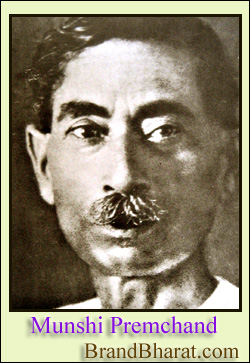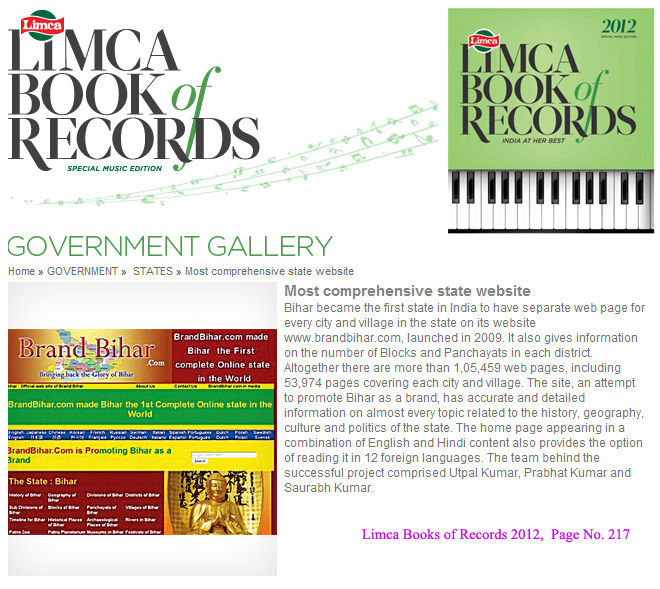


हिन्दी साहित्य मुख्य पृष्ट पर जाने के लिये क्लिक करें
Premchand was the pen name adopted by the Hindi writer Dhanpatrai who was born on 31 July 1880 at Lamahi near Varanasi. His early education was in a madarasa under a Maulavi, where he learnt Urdu. When he was studying in the ninth class he was married, much against his wishes. He was then fifteen. In 1919, while he was a teacher at Gorakhpur, he passed his B.A., with English, Persian and History. He had a second marriage with Shivarani Devi, a child-widow, who wrote a book on him, 'Premchand Gharmein' after his death. Premchand's literary career started as a freelancer in Urdu. In his early short stories he depicted the patriotic upsurge that was sweeping the land in the first decade of the present century. Soz-e-Watan, a collection of such stories published by Premchand in 1907, attracted the attention of the British government. In 1914, when Premchand switched over to Hindi, he had already established his reputation as a fiction writer in Urdu. Premchand was the first Hindi author to introduce realism in his writings. He pioneered the new art form – fiction with a social purpose. He wrote of the life around him and made his readers aware of the problems of the urban middle-class and the country's villages and their problems. He supplemented Gandhiji's work in the political and social fields by adopting his revolutionary ideas as themes for his literary writings. Premchand was a prolific writer. He has left behind a dozen novels and nearly 250 short stories. Seva Sadan was his first novel. He believes in the principle: 'hate the sin and not the sinner.' His best known novels are Sevasadan, Rangamanch, Ghaban, Nirmala and Godan. Three of his novels have been made into films. Besides being a great novelist, Premchand was also a social reformer and thinker. His greatness lies in the fact that his writings embody social purpose and social criticism rather than mere entertainment. Literature according to him is a powerful means of educating public opinion. He believed in social evolution and his ideal was equal opportunities for all. Premchand died in 1936 and has since been studied both in India and abroad as one of the greatest writers of the century.
31st July is Munshi Premchand's Birth Anniversary
A pioneer of modern Hindi and Urdu social fiction, Munshi Premchand's real name was Dhanpat Rai. He wrote nearly 300 stories and novels. Among his best known novels are: Sevasadan, Rangmanch, Gaban, Nirmala and Godan. Much of Premchand's best work is to be found among his 250 or so short stories, collected in Hindi under the title Manasarovar.Three of his novels have been made into films.Premchand's literary career started as a freelancer in Urdu. He was born at Lamahi near Banaras (now Varanasi) on 31st July,1880. His father Munshi Ajaib Lal was a clerk in the postal department. Premchand's early education was in a madarsa under a maulvi, where he learnt Urdu. Premchand was only eight years old when his mother died. His grandmother took the responsibility of raising him but she too died soon. He was married when he was 15 and in the 9th grade . His father also died and after passing the intermediate he had to stop his study. He got a job as a teacher in the primary school. In 1919, he passed his B.A., with English, Persian and History. After a series of promotions he became Deputy Inspectors of Schools. In response to Mahatma Gandhi's call of non-cooperation with the British he quit his job. After that he devoted his full attention to writing. His first story appeared in the magazine Zamana published from Kanpur.In his early short stories he depicted the patriotic upsurge that was sweeping the land in the first decade of the past century. Soz-e-Watan, a collection of patriotic stories published by Premchand in 1907, attracted the attention of the British Government In 1914, when Premchand switched over to Hindi, he had already established his reputation as a fiction writer in Urdu. While writing Urdu novels and short stories he emphasised in presenting the realities of life and he made the Indian villages his theme of writing. His novels describe the problems of the urban middle-class and the country's villages and their problems. He also emphasised on the Hindu-Muslim unity. His famous works include Godan, Maidan-e-Amal, Bay-wah, Chaugaan etc.It would not be wrong to say that Premchand was the Father of Urdu short- stories. Short stories or afsanas were startedby Premchand. As with his novels, his afsanas also mirror the society that he lived in. With a simple and flowing writing some of his works depict excellent use of satire and humour. His later works used very simple words and he started including Hindi words too to honestly potray his characters. His famous afsanas are Qaatil Ki Maan, Zewar Ka Dibba, Gilli Danda, Eidgaah, Namak Ka Daroga and Kafan. His collected stories have been published as Prem Pachisi, Prem Battisi, Wardaat and Zaad-e-Raah. Premchand was the first Hindi author to introduce realism in his writings. He pioneered the new form - fiction with a social purpose.He supplemented Gandhiji's work in the political and social fields by adopting his revolutionary ideas as themes for his literary writings. Besides being a great novelist,Premchand was also a social reformer and thinker.His greatness lies in the fact that his writings embody social purpose and social criticism rather than mere entertainment. Literature according to him is a powerful means of educating public opinion.He believed in social evolution and his ideal was equal opportunities for all.Premchand died in 1936 and has since been studied both in India and abroad as one of the greatest writers of the century.

Bihar became the first state in India to have separate web page for every city and village in the state on its website www.brandbihar.com (Now www.brandbharat.com)
See the record in Limca Book of Records 2012 on Page No. 217